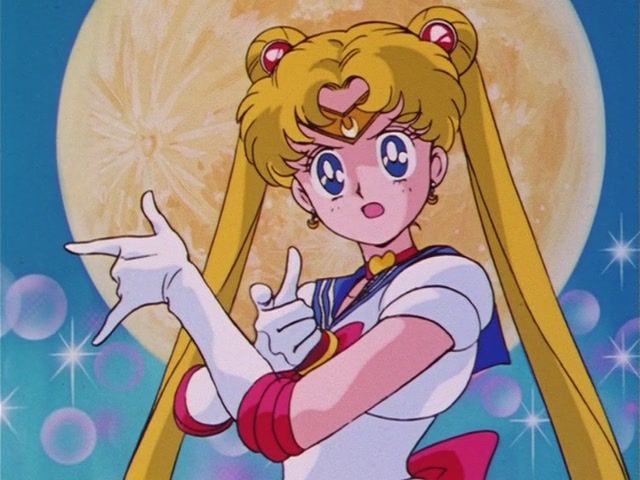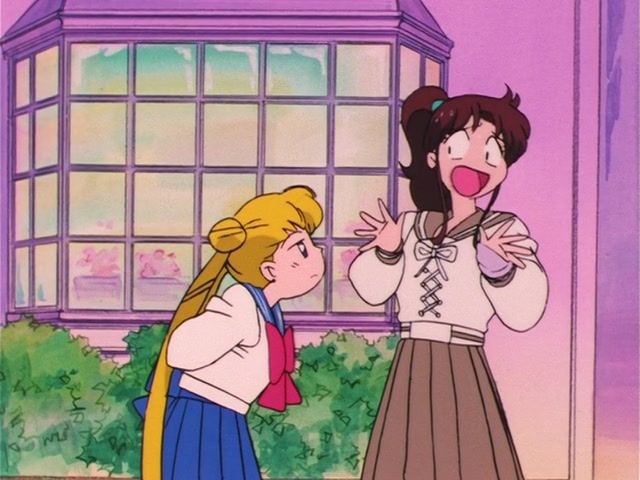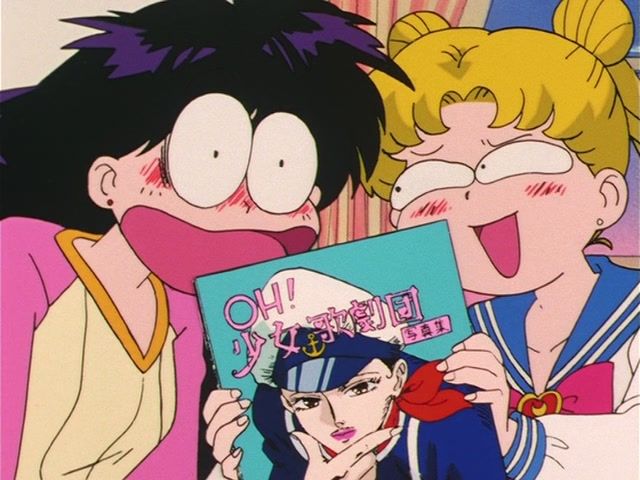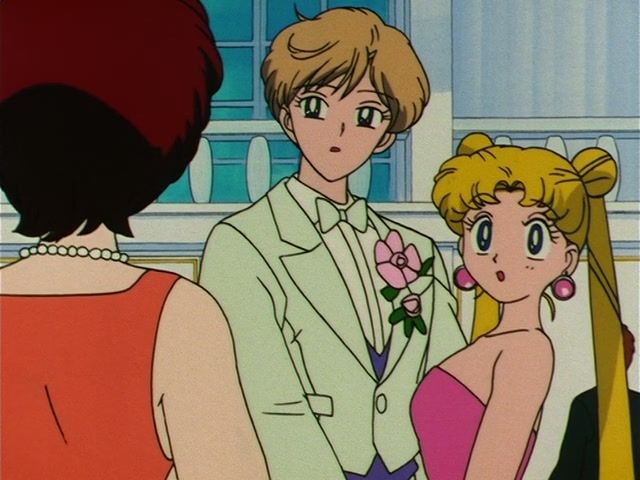Create a free profile to get unlimited access to exclusive videos, sweepstakes, and more!
Sailor Moon and the queer art of questioning gender and sexuality
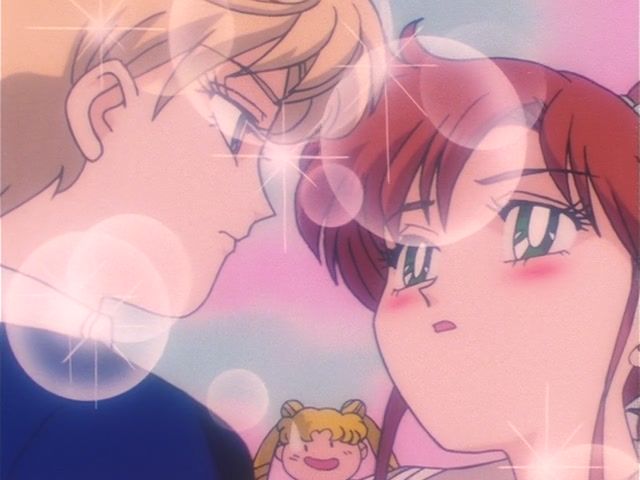
The textual and subtextual queer delights of Sailor Moon are as well-recorded as they are plentiful, from boasting one of anime’s first positive queer couples to flirting with gender fluidity to casually rebooting the musical side of the franchise with an all-woman cast.
But there’s one story from the annals of Sailor Moon that I don’t often see brought up in this context: the arc from Sailor Moon S where the Inner Guardians—Usagi, Ami, Rei, Makoto, and Minako—meet gay soft butch dreamboat Haruka, swoon, and, for the first time in their teen lives, question their own concepts of sexuality and gender.
And that’s a shame, because this arc normalizes and de-escalates a poorly represented part of queer development: questioning.
Like many television adaptations of comics and manga, the original Sailor Moon anime is notorious for its filler. But honestly? I love it. The filler episodes not only give the story space to breathe, they also offer character development for characters not named Usagi Tsukino.In the original manga, while the other girls do think Haruka is plenty cute, it’s only Usagi who moons after her for a hot second, finding it difficult to face her boyfriend Mamoru after dreaming about making out with Haruka. (Usagi Tsukino: the Original Bisexual Disaster.) But their relationship ultimately becomes downright chivalrous, where there’s an emotional but distant charge to Haruka’s vow to protect Usagi as the Sailor Uranus to her Sailor Moon/Princess Serenity.
The anime, however, explores the questions Haruka raises for the Inner Guardians in more depth.
When Usagi and Minako meet Haruka at their local arcade, they immediately fall over themselves chasing her down—or, rather, “him,” as they originally mistake her for a boy. (This isn’t simply because Haruka’s butch; she uses the Japanese personal pronoun “boku,” which is almost always used by men.) Even Rei, a shrine maiden who attends a Catholic school, isn’t unaffected. When Rei declares that she can’t possibly imagine someone going after another woman, Usagi immediately drags out all of her copyright-friendly definitely not Takarazuka musical albums—which only feature women together, under the pretext of women playing men's roles. Only resident socially awkward genius Ami takes Haruka largely in stride. Instead, Michiru inspires her to stop being nice and start getting real (helping a straight girl self-actualize: classic '90s lesbian move).
But the best reaction by far is Makoto’s, which gets an entire episode devoted to it: “Cold-Hearted Uranus? Makoto in Danger.”
As the tallest and strongest of the Inner Guardians, Makoto sometimes feels awkward and too “boyish” to be as girly as she truly is. Early in the episode, she confides to Usagi that she started learning how to cook to, essentially, apologize for her body to any potential male partners.When Haruka nearly hits them with her motorcycle, Makoto is utterly enchanted by Haruka’s gallantry as she apologizes. Even Usagi notices, and reports to the rest of the team. They react with all the tact and sensitivity of a self-policing pack of 14-year-old straight (“straight”) girls in 1993, so they beg her not to give up on men. (The recent Viz dub softens their language; their bone of contention isn’t that Haruka’s a woman, but that she already has a girlfriend.)
But, as Makoto reassures them throughout the episode, they’ve got it wrong (I mean, I think that nuzzle she gives Haruka says otherwise, but I’m here to support Makoto on her journey, not undermine her). Haruka hasn’t caused her to question her sexuality; she’s inspired Makoto to question her gender presentation. Haruka is a wonderful, strong, and brave woman, just the kind of woman Makoto aspires to be, and she doesn’t apologize at all for her strength, her body, or her butchness. This confidence inspires Makoto to feel more confident about her own gender presentation. At the end of the episode, we see Makoto in a store, trying both a very girly scarf and some of Haruka’s signature moves, just to see if they fit.
Haruka’s presence raises questions for all of the girls—and they’re better for knowing the answers.
Growing up, I was terrified of asking myself any questions like that.Luckily, no one had thought to grab me by the scruff of the neck as a wee babe and inform me that homosexuality was bad, but that oversight was the sum total of my knowledge. It was definitely OK to be gay, but beyond that, I was in the dark.
The limited representation I had access to in the late '90s and early aughts always seemed to open in media lez, featuring already fully actualized queer characters declaring themselves to Straight World for reasons (and then usually disappearing again). If, perchance, I did catch a character in the act of questioning, it was treated with all the weight and gravitas of a diagnosis. To a kid who spent a lot of time baffled at the mere fact of existing in a corporeal body, that was a 400-level course. Where on earth were the prerequisites?
Piecing together what I could from what I had, I thought one knew with absolute certainty if you were gay or straight—there was no room for being confused, asking questions, or any other kinds of queerness. Questioning felt threatening, especially in a household where everything from same-sex attraction to ill-advised highlights was tagged with the withering condescension of “that’s just a phase,” something to be avoided at all costs.
Even when my subconscious tried to help me out with a dream or something, I’d spend the next day in a panic, running through scenarios in my head that “proved” I wasn’t gay. This wasn’t because I was scared of being gay—though I’m sure that subconsciously came into play—but because I truly believed that asking questions and not knowing meant that I couldn’t be gay.
Because if I was… I’d know, right? I wouldn't have to ask?
I never know that questioning was not only OK, but also natural, necessary, and good. I never knew that it could be exciting and exploratory, instead of inciting full-blown defensive anxiety spirals.
So seeing such a classic shoujo anime present questioning in a positive light shook me, at the age of 28, to my core in the best way. Haruka and Michiru aren’t Very Special Episode Lesbians; they’re fully-fledged and beloved characters that the girls look up to as the epitome of a cool, mature couple throughout the show. The girls’ attraction to Haruka isn’t brought up for one episode as a teachable moment and then discarded, never to be spoken of again. Haruka becomes as safe to flirt with and seek validation from as Mamoru—not because her gender invalidates the attraction, but because Haruka would never stray from Michiru. When the Guardians attend a fancy dress ball, Haruka asks Usagi for a dance, leaving her teammates to spend the rest of the night fighting over who gets to dance with Haruka next. Even Rei happily flirts with Haruka.And the benefits to their questioning don't end with making an awesome new friend (that they would not mind smooching). When the girls catch Rei playing hooky to get coffee with a girl they don’t know, the girls wonder if it’s a date, specifically citing Haruka as an example. Makoto even considers that Rei’s supposed date might be gender nonconforming—albeit in the painfully unwoke language of a ‘90s shoujo anime. And when Usagi embarks on an emotionally tense but undefined relationship with one of the genderfluid Sailor Stars, Seiya, in Sailor Moon Stars (their transformation sequences involve magically transitioning), the reason the other characters try to keep them apart is not because Seiya is “actually a woman,” but that Usagi is already in a committed relationship (otherwise, let’s be real: there is absolutely no contest. Smell ya later, Mamoru!)
It would be a disservice to present this as the ultimate in queer representation. At the end of the day, this is a decades-old shoujo anime whose main characters would likely not identify as anything other than straight. But the girls’ own answers to the questions Haruka raises—am I attracted to other women? It is OK to be attracted to other women? Is it OK for me to be a woman in a different way than what society tells me?—clearly better their own understanding of themselves. Modeling that kind of questioning, as something that can be grounding and nurturing rather than terrifying and isolating, is an important and rare depiction of a crucial life skill for queer youth in an anime aimed at young girls.
Sailor Moon could never have done that for me in real-time; it was off the air by the time I needed it, and the infamous DiC dub severely straightwashed the anime. But knowing that it exists for current and future generations, even those who might not seek out such a nuanced representation, makes my heart feel glad… and even a little proud.
The views and opinions expressed in this article are the author's, and do not necessarily reflect those of SYFY WIRE, SYFY, or NBC Universal.
